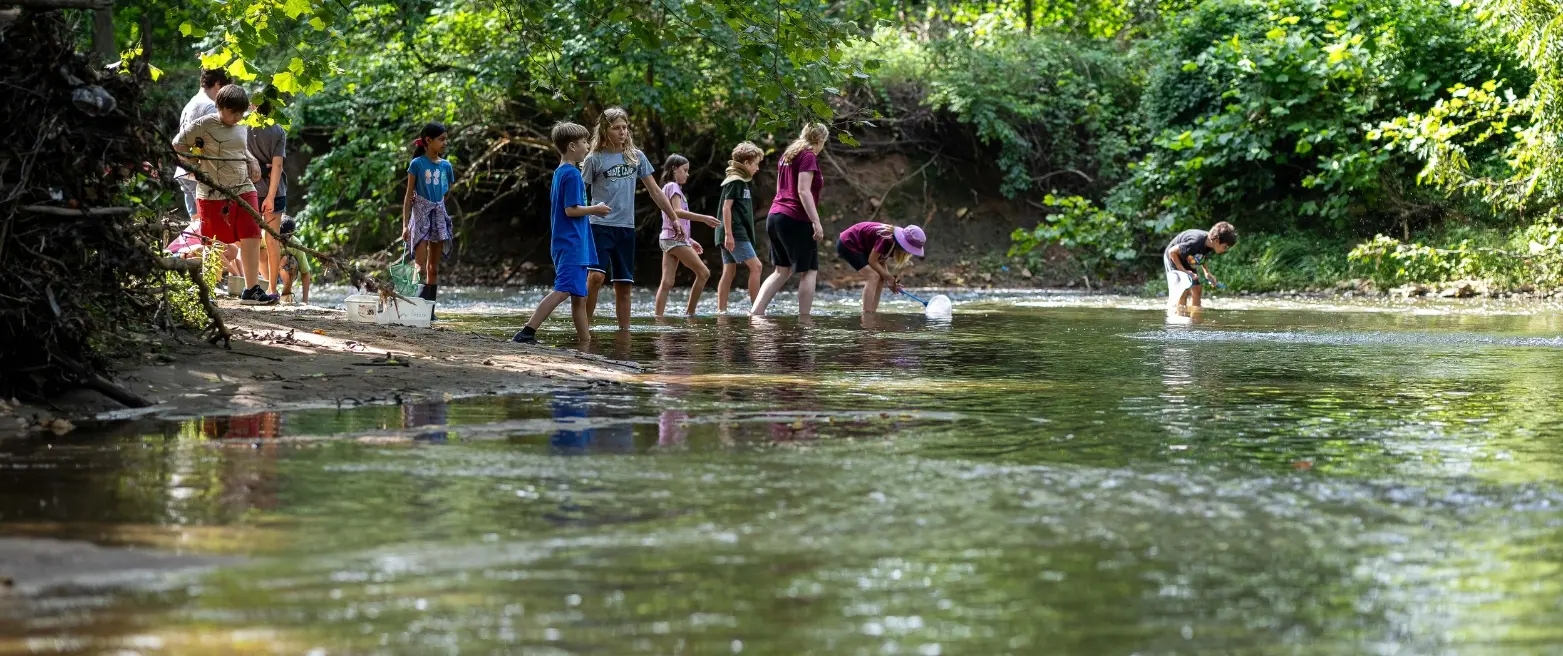Now Streaming! Why Protecting Precious Local Waterways Is a Call Everyone Should Heed
Nature Forward Releases 2024 State of the Stream Report
For Immediate Release – April 17, 2024
For more information contact Lisa Goodnight at [email protected] or 301-523-5394, or Vince Robinson at [email protected], or 904-710-8224
Chevy Chase, MD – Streams are present in almost every community and play a pivotal role in human health, the health of our rivers, and the health of the Chesapeake Bay. Despite their vital importance, we’re not doing enough to protect them. To inform, educate, and spur action, Nature Forward is shining a light on the problem with the release of the 2024 State of the Streams Report. The online report, available at natureforward.org/sos24, provides a unique snapshot of five natural resources in our region: Accotink Creek, Little Falls Branch, Rock Creek, Seneca Creek, and Sligo Creek.
Nature Forward, along with representatives from partner organizations Friends of Accotink Creek, Little Falls Watershed Alliance, Rock Creek Conservancy, Seneca Creek Watershed Partners (SWPN). and Friends of Sligo Creek will discuss the State of the Streams Report during an April 18 report release event at Meadowbrook Local Park in Chevy Chase, Md. The event is set to begin at 1 pm. Montgomery County Councilmembers Evan Glass and Kate Stewart, Chris Herrington, Director of Fairfax County Department of Public Works and Environmental Services and Steve Saari, Acting Deputy Director with the DC Department of Energy & Environment, are all scheduled to appear.
“This is an opportunity to hear first-hand from local leaders from who can talk about the challenges our streams face and what we can do to improve them,” says Lydia Lawrence, Nature Forward’s Director of Conservation.” Our report evaluated five streams across DC, MD & VA and found that all five were harmed by increasing impervious surface and invasive plants, and by decreasing forests. The good news is that there are actions that residents and communities can take to protect our streams.”
One of the report’s core messages is that everyone can do (at least) one thing for the streams that do so much for us and together we can make progress. Go to the report tabs “Speak Up” “Monitor” “Volunteer” or “Donate” to find a variety of ways to get involved from planting native trees to becoming a Nature Forward stream monitor to joining a cleanup.
The streams were evaluated on four major criteria: Water Quality, Biodiversity and Habitat, Climate Resilience, and Access to Parks. Based on data collected for all of those metrics, all five Streams had “Fair” scores.
“The report’s methodology is unique because the metrics don’t solely focus on what’s in the water,” Lawrence adds. “The report also highlights how both wildlife and humans access the streams, and how stream health impact both.”
“The health of Seneca Creek, the largest watershed in Montgomery County, is inextricably linked to the well-being of our communities and ecosystem,” says Kevin Misener, President of Seneca Creek Watershed Partners (SWPN). “This new report provides crucial data that will guide our efforts to restore and protect this vital resource, ensuring clean water and a healthy environment for all residents and visitors to the watershed.”
“Streams like Accotink Creek are both the first and the most accessible line of defense for our rivers, bays, estuaries, and oceans, the place where our litter and polluted runoff initially converges. They also play a significant ecological role in their own right and provide community access to observe nature. Nature Forward’s report independently validates what we need to do, starting with protecting wetlands, reducing impervious surfaces, reversing deforestation, and eliminating fish passage blockages,” said Gary Bangs of Friends of Accotink Creek.
However, the report doesn’t stop at describing the condition of the streams – it also encourages people to take proactive steps to restore and protect the health of our streams. Suggested actions include advocating to elected leaders, volunteering, and donating to organizations dedicated to stream restoration, and more.
“Our streams require special care to preserve the forests, keep down the trash and invasive vines, and support stormwater capture especially up into the neighborhoods to help the stream to become more healthy for the critters that live in it,” explains Kit Gage, Director of Advocacy at Friends of Sligo Creek. “Friends of Sligo Creek is very active in all these fronts and welcome more help.”
#30#
About Nature Forward: Throughout its history, Nature Forward, first established in 1897 as the Audubon Society of the District of Columbia, has championed nature for all by playing a pivotal role in conserving our region’s iconic natural places from development including the C&O Canal, Dyke Marsh and, most recently, Ten Mile Creek. Past member and board president, Rachel Carson, author of Silent Spring, is credited with launching the now global environmental movement. Nature Forward’s nature experts provide hundreds of opportunities each year for people of all ages and abilities to enjoy, learn about, and protect the environment.

